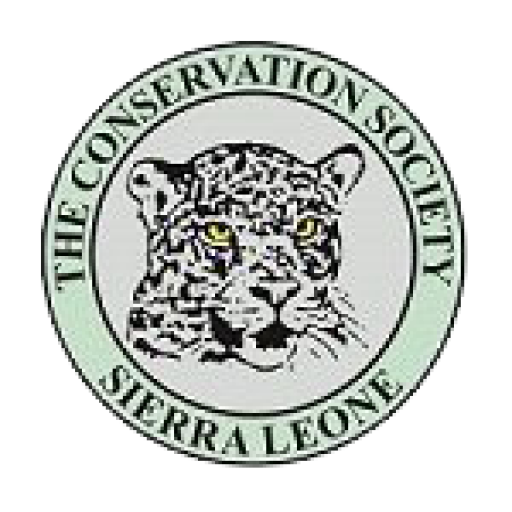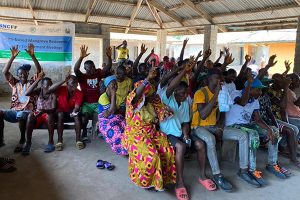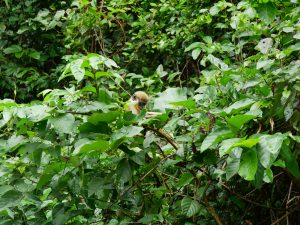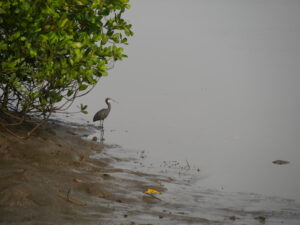Background - information about previous work at WAP-NP
The Western Area Peninsula – National Park (WAP-NP) covers 17,000 hectares, spanning the western area of Sierra Leone; it encompasses Freetown, the capital, and is home to 1.5 million people. It is one of the eight biodiversity hotspots in Sierra Leone and hosts 80-90% of the country’s terrestrial biodiversity including the endangered and threatened species; the red colobus, pygmy hippopotamus, chimpanzee, white-necked Picathartes, and Jentink’s duikers, as well as numerous endemic and medicinal plant species. In addition, it serves as a water catchment area that supplies the capital of Freetown. Nevertheless, the coastal areas around the WAP-NP are highly vulnerable to increased frequency and severity of coastal erosion, flooding and storm surges which severely impact social well-being, livelihood security, water resources and major economic sectors such as fishing, tourism and agriculture. The WAP-NP also faces numerous threats caused by unsustainable human practices such as sand and stone extraction, deforestation, unplanned urbanization, land grabbing and reclamation, poor waste management, illegal logging for charcoal, mining, farming, hunting and climate change. These induced pressures have led to the loss of biodiversity and habitat for many threatened species due to alarming deforestation and requires integrated action to ensure its conservation and maintain sustainable development. The aforementioned threats have adverse impacts on the health and well-being of the people living in rural communities. These rural communities are mostly pigeon-holed settlements that often experience flooding, coastal erosion, and mudslides resulting in significant loss of lives, livelihoods, and property among others.
In September 2023, CAFOD in collaboration with the Conservation Society of Sierra Leone and Caritas Freetown submitted an expression of interest (EoI) to Jersey Overseas Aid Commission (JOA) to solicit funds for the implementation of an Integrated Action for Ecosystem Conservation and Sustainable Livelihoods in the Western Area Peninsula. This action was intended to contribute to reduced coastal community vulnerability to climate change shocks and improved community well-being of vulnerable forest-edge and coastal-edge communities (especially youths and women). In a wide-ranging approach, the project envisioned to conserve or restore threatened ecosystems in the Western Area Peninsula whilst facilitating livelihoods and development of forest and coastal communities.
Situation we are facing
CSSL and Caritas-Freetown are seeking financial support from CAFOD to pilot a small-scale climate-resilient livelihoods and awareness-raising/advocacy project to generate evidence and sufficient data to support the next round of JOA call for proposal and other potential opportunities the organisations might want to pursue. The pilot, as envisioned, has the potential to link conservation and livelihoods in order to generate net positive, measurable social and environmental outcomes alongside a financial return for poor/impoverished rural communities in the catchment areas. In addition, the pilot will aid in demonstrating the value of integrating biodiversity conservation and poverty alleviation through interdisciplinary knowledge-generation and engagement between implementing partners (CSSL and CF) and all stakeholders. Overall, the pilot will prepare and better position CAFOD, CSSL and Caritas-Freetown to pursue substantial grants such as the JAO funding for the conservation and management of the environment. The proposed pilot will target one forest and one coastal communities in the WAP-NP coverage area.
Our Goals
The overarching goal of the project is to pilot sustainable livelihood opportunities that improve the well-being of vulnerable local communities while conserving the threatened ecosystems in the WAP-NP.
Our Approach
community consultation, involvement, collaboration and participation
Our Activities
Outcome 1: Promote improved conservation and management of WAP-NP through restoration of at least 10 hectares of degraded habitats, capacity building, and support the implementation of climate-resilience livelihood initiatives
A series of simple but sequential steps will be taken to prepare two communities of the WAP-NP for conservation livelihoods initiatives as follows
Activities:
- Convene project inception meeting
- Conduct community participatory assessment on livelihood, conservation issues and opportunities
- Conduct validation of participatory assessment findings
- Identify and pilot two climate-resilient livelihood opportunities in two communities (for examples, vegetable and groundnut farming)
- Provide training on identified climate-resilient livelihood opportunities.
- Restore at least 10 hectares of degraded habitats
Outcome 2: Provide feedback that will improve economic and environment benefits to WAP-NP communities that protects the environment with sustainable livelihood actions.
Activities:
- Establish/revive and support community schools nature clubs with IEC materials
- Organise school excursion with school nature clubs
- Conduct radio and television talk shows
- Community roadshow/drama
- Develop and air jingles
- Establish/review existing community bye-laws
- Develop, print and distribute IEC materials
- Organize quiz competition and art-work.
Outcome 3: Project activities effectively monitored to track and document progress, learning and impact.
Activities:
- Conduct project planning and review meeting
- Generate lessons learnt from project implementation to document success, challenges and areas for improvement for future interventions
- Establish and implement a feedback and complaints redress mechanism
- Conduct after action review (AAR).

Aruna Koroma
Project Manager
More information
For more information, if you want to engage yourself in this project please contact our
Project Manager Aruna Koroma: aruna.koroma@cs-sl.org
News about our work at the Western Area Peninsula Forest
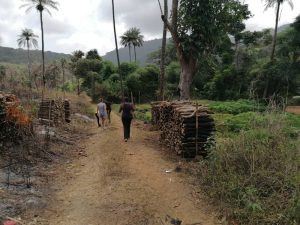
Big Water Community Gears up to Benefit from a CAFOD Supported Conservation Livelihood Project
“…if we continue to destroy this forest through stone mining, logging, slash-and-burn farming and many other practices, disasters such as flooding, water shortage and disease
